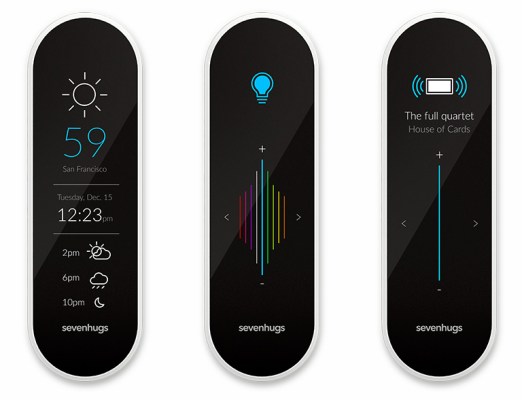French startup Sevenhugs closed a $14.6 million Series A today led by Xerys on a quest to better integrate smart home technology. Sevenhugs has already developed a sleep tracker and is nearing completion on development of a universal smart-remote.
Sevenhugs joins Misfit, Hello, and others with its hugOne sleep-tracker. When it launches, the remote will let users simply point to control a wide array of connected-home devices.
From coffeemakers at college hackathons to TVs at your local Best Buy, everything is smart these days.
Sevenhugs wants to put a spark back into internet-of-things by enabling smart-devices to interact with each-other. With the Sevenhugs remote, users will be able to just point at their television and control it while dimming lights with the Philips Hue and warming the room with a Nest Thermostat. The Sevenhugs hugOne smart sleep-tracker also integrates with these same devices to enable a more connected, reactive, sleep experience.
It makes intuitive sense that the smartphone be the hub of the smart-home but Sevenhugs is betting otherwise.
“There are hundreds of applications that allow you to control your TV from your smartphone but I have never found anyone that uses smartphones to control their TV,” said Simon Tchedikian, CEO of Sevenhugs.
Once you take the time to evaluate your own life, it starts to make sense. My phone is consistently either dead or charging. When I do have it, I am forced to go through a myriad of steps to put it to use controlling my television. First you have to unlock the device while managing not to get distracted by notifications from Gmail, Facebook, Instagram, Slack, Snapchat, Twitter, iMessage, GroupMe, LinkedIn, NYT Now, CNN, and the half dozen other things that turn my phone into the human version of the old Rat Park experiments where lab mice become so chemically dependent they forget to feed themselves. Then you have to navigate to the right app, since each smart device typically comes with its own interface.
Sevenhugs is making a bold move by opting for a hardware solution to better integrate smart-devices. Moving forward, Sevenhugs wants even more devices from disparate ecosystems to be able to talk to each-other in an intuitive way.
Nest acquired smart-hub manufacturer Revolv only to cut integration two years later. Strategic partnerships are going to be key for Sevenhugs as the company prepares to launch in the United States and brush up closer with cash-rich well-connected companies like Alphabet and Microsoft. Today Sevenhugs is also opening a US office in San Francisco.
“Devices must be able to make decisions based on our habits without us telling them. The future of the smart home is when people don’t see it anymore,” added Tchedikian.
SevenHugs is preparing to launch in the United States and will be using the new capital to generate brand awareness.
